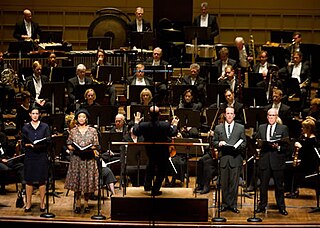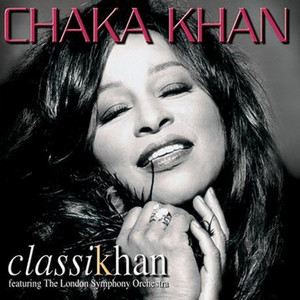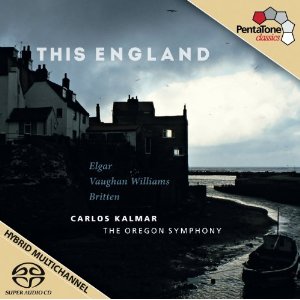
The Dallas Symphony Orchestra (DSO) is an American orchestra based in Dallas, Texas. Its principal performing venue is the Morton H. Meyerson Symphony Center in the Arts District of downtown Dallas.

Erkki-Sven Tüür is an Estonian composer.
John Harris Harbison is an American composer, known for his symphonies, operas, and large choral works.
Symphony No. 1 (Low) is a symphony by Philip Glass based on David Bowie's 1977 album Low.
Nicolas Oreste Flagello was an American composer and conductor of classical music. He was one of the last American composers to develop a distinctive mode of expression based wholly on the principles and techniques of European late romanticism.
Richard Danielpour is an American composer.
Joseph Clyde Schwantner is a Pulitzer Prize-winning American composer, educator and a member of the American Academy of Arts and Letters since 2002. He was awarded the 1970 Charles Ives Prize.
The Clinton String Quartet is a string quartet based in the Syracuse, New York area. Active for over 15 years, their most prominent works have been the debuts of many 20th century classical recordings with the Syracuse Society for New Music. All four members are also members of the Syracuse Symphony Orchestra.

Gershwin's World is a studio album by the American jazz pianist Herbie Hancock. Prominent guests include Joni Mitchell, Kathleen Battle, Stevie Wonder, Wayne Shorter and Chick Corea.

Behzad Ranjbaran is a Persian composer, known for his virtuosic concertos and colorful orchestral music. Ranjbaran's music draws from his cultural roots, incorporating Persian musical modes and rhythms.
John McLaughlin Williams is a Grammy award-winning American orchestral conductor and violinist.

The string section is composed of bowed instruments belonging to the violin family. It normally consists of first and second violins, violas, cellos, and double basses. It is the most numerous group in the standard orchestra. In discussions of the instrumentation of a musical work, the phrase "the strings" or "and strings" is used to indicate a string section as just defined. An orchestra consisting solely of a string section is called a string orchestra. Smaller string sections are sometimes used in jazz, pop, and rock music and in the pit orchestras of musical theatre.

ClassiKhan is the tenth studio album by American R&B/funk singer Chaka Khan, featuring the London Symphony Orchestra, Produced and arranged by Eve Nelson and released in 2004 on the at the time still independent label Sanctuary Records in the U.K., on Earthsong/AgU Music Group in the U.S. and in 2005 also in Japan on JVC Victor.

Dedicated to the One I Love is an album of rock classics reinterpreted as children's lullabies by American singer, songwriter and producer Linda Ronstadt.

The Oregon Symphony, based in Portland, Oregon, was founded in 1896 as the Portland Symphony Society; it is the sixth oldest orchestra in the United States, and claims to be one of the largest arts organizations in the Pacific Northwest. The Symphony has released nineteen studio albums and one compilation album through the record labels Delos, Koch International Classics, Albany and PentaTone Classics. The first recording, Bravura (1987), was released under the artistic leadership of James DePreist. It received favorable reviews and was the first of three released through Delos. The next two recordings were collections of compositions by Sergei Rachmaninoff and Pyotr Ilyich Tchaikovsky.

This England is a classical music album by the Oregon Symphony under the artistic direction of Carlos Kalmar, released by Dutch record label PentaTone Classics in November 2012. The album was recorded at the Arlene Schnitzer Concert Hall in Portland, Oregon, at five performances in February and May 2012. It contains works by three English 20th-century composers: Edward Elgar's Cockaigne , Ralph Vaughan Williams' Symphony No. 5, and "Four Sea Interludes" and "Passacaglia" from Benjamin Britten's opera Peter Grimes. The recording was the orchestra's second under Kalmar's leadership, following Music for a Time of War (2011), which also included works by Britten and Vaughan Williams. This England received positive critical reception but failed to chart.

Orchestral Works by Tomas Svoboda is a classical music album by the Oregon Symphony under the artistic direction of James DePreist, released by the record label Albany in 2003. The album was recorded at the Arlene Schnitzer Concert Hall in Portland, Oregon during three performances in January and June 2000. It contains three works by Tomáš Svoboda, a Czech-American composer who taught at Portland State University for more than 25 years: Overture of the Season, Op. 89; Concerto for Marimba and Orchestra, Op. 148; and Symphony No. 1, Op. 20. The album's executive producers were Peter Kermani, Susan Bush, and Mark B. Rulison; Blanton Alspaugh served as the recording producer.
Shadows, Op. 52, is an orchestral prelude by the Finnish composer Aulis Sallinen, who wrote the piece in 1982 on commission from the National Symphony Orchestra Association. The prelude's thematic material is closely related to Act III of Sallinen's third opera, The King Goes Forth to France, on which he also was at work in 1982, writing Shadows upon completion of Act II of the opera. Nevertheless, the composer has emphasized that Shadows is "an entirely independent orchestral work", albeit one whose "lyrical and dramatic ingredients reflect the philosophy of the opera". The National Symphony Orchestra (NSO) premiered the work on 30 November 1982 at the Kennedy Center in Washington, D.C., under the direction of its music director, Mstislav Rostropovich. Shadows so impressed Rostropovich and his orchestra that the NSO requested Sallinen compose a symphony for them, the result of which would be the Fifth (1985).
The Symphony No. 4, Op. 49, is an orchestral composition by the Finnish composer Aulis Sallinen, who wrote the piece from 1978–79 for a commission from the City of Turku, to celebrate its 750th anniversary. The Turku Philharmonic Orchestra premiered the work on 9 August 1979, under the direction of its principal conductor, Pertti Pekkanen.












